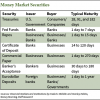Sorry, no content matched your criteria.
Featured Story
What Are Money Market Funds?

What are money market funds?
That's a question all risk-averse savers sitting on a savings account with its meager returns, or on a CD with its withdrawal penalties, should be asking themselves if they're looking for a liquid investment with better returns.
What are money market funds?
That's a question all risk-averse savers sitting on a savings account with its meager returns, or on a CD with its withdrawal penalties, should be asking themselves if they're looking for a liquid investment with better returns.
